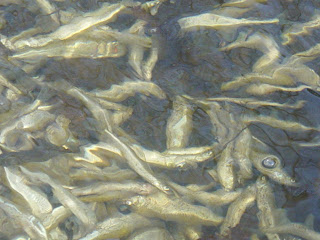
Last weekend I was back in Fort Frances. Here are some photos I took. Right next to the Nanicost Building where Seven Generations Education Institute is housed, is Rusty Myer's Fly-in Outposts where you can charter a plane to go fishing to some inland camp or resort. The colours of the old oil barrels caught my eye, but I am sure this is not the image you will find on
Rusty Myer's promotional literature.

Saturday morning when I woke up and looked out the window of our hotel room, this is the sunrise I saw coming over Rainy Lake. As the ice on the lake was well on its way to thawing, the ice huts of the Americans, which earlier were lined up along the US side of the lake, were now packed in for the season.

The next day the same lake, the same horizon, looked like this.

Along the lake, at Couchiching Point, there are numerous trees, most covered in lichen on the north side of their trunks.

By the shore, someone had left behind the pike carcasses that they had cleaned the fillets from.

Right after the rail bridge to the US, a small island sits smack dab center of Rainy River, midway between the US and Canadian banks.

Looking down, I saw interesting orange coloured dried out grassy weeds

that looked like the fur of an old bear.

There are some large old red pine logs along the shore here;

perhaps there used to be a dock of some sort here in days gone by. The logs are weathered but their pinkness is still visible.

Along the railway tracks, red willow bushes jumped out.

Closer to the beach, a large, very noisy flock of ring billed gulls sat on the residual slushy ice lining the shore. I was puzzled why they were all facing south west. Perhaps they were listening to an early evening wind symphony.

Further down the beach, a large flock of Canada Geese stood at the ridge of the water, jeweling the large stain glass plate of ice.

We had stopped at Lake Windigoostigwan on the way down. When we got out of the car, the wind was whipping with a fury. I went off to climb the "killing stone," and sure enough, I found a few more feathers. The raptors have not eased up on their hunting. I heard a loud moaning and groaning coming from this direction. I wasn't sure what it was. At first I thought there was something down there, something or someone by the shore. Then, I thought it might be the sound of the water calling out from beneath the ice as it was cracking up. The moaning and howling traveled through the trees. It sounded very eerie.

From the same spot, but from this direction, you enter the magical enchanted forest at
Lake Windigoostigwan. The path will lead you down to the lake. It is one of many paths, for the lake is huge. The sounds of the moaning, however, combined with the wind whistling through the trees, prevented me from following the path. I said to myself, "this is silly; there is nothing down there. My ears are playing tricks on me." Still, I felt apprehension to keep going, so I turned around and went back the way I came.

When I got back to the car, my husband asked me, "Did you hear those drums? Someone is drumming, I think."
"No, it is not drumming," I said, not quite convinced. "Although it sounds like someone is drumming." We looked across the lake. I said, "No, no one is drumming. Don't you know what lake this is? This is the lake of the
Windigo."




























